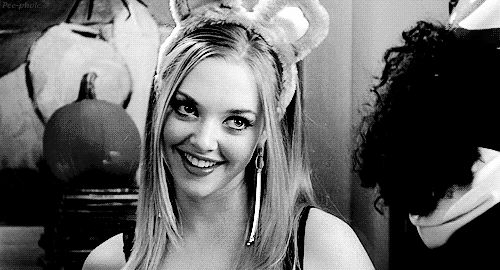Theory: The movie has such enduring power and is quoted so much because it sheds some incredible light on real sociological phenomena.
It’s compelling because it’s believable. It feels real. It might seem like a show about teenage girls, but it’s as nail-bitingly exciting as Late Night Poker, because it demonstrates decision-making, with stakes.
Let’s dig in.
Our story begins with Cady.
Cady’s been homeschooled her whole life, which makes her a perfect “blank slate” character to explore social reality with. What is “normal” to us is strange and foreign to her.
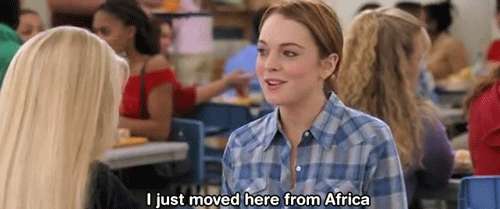
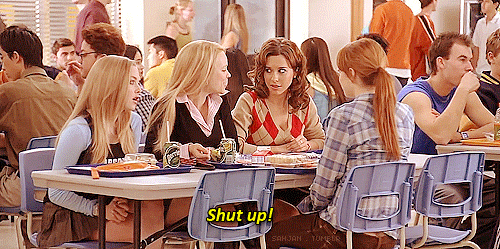

Cady is compelling as a fish out of water.
She has no preconceived notions of how people behave or ought to behave in cliques and groups. She’s “fresh”, almost alien.
We relate to her immediately. We all know what it’s like to be thrust into an environment where we don’t know the rules.
The first thing that happens when she shows up at school is… overwhelming chaos. She’s unable to make sense of the elaborate, cascading complexity that are high-school social relations.

Fish out of water, Alien visits Earth, you name the trope. We all sympathize with a character like this, and more importantly, she allows us to reveal and acknowledge the unique characteristics of our habitat. She’s unaware of all the unspoken rules, and takes appearances to be reality.
“Seeing is believing” is a natural human tendency, and we all know what it’s like to play by one set of rules before discovering that there’s a second, unspoken set of rules that actually govern the game.
Like all newcomers, Cady gets pushed around.
This is standard operating protocol. It happens to the new girl in prison in Orange Is The New Black, it happens to each new employee that shows up in The Office.
What’s actually happening? Jostling for position.
Groups need to sniff new individuals out to see where they ought to stand in the heirarchy. A social group typically has a clearly defined Alpha and Omega, and everything in between is largely illegible.
The alpha group in Mean Girls are the Plastics, while the Omega are Janis and Damien- the suspected lesbian and the fat gay boy. Both relatively unattractive, relatively unremarkable. The Asians, etc are the in-between groups. Insignificant in the grand scheme of things.

The second likeliest group to take Cady in would’ve been the math nerds.
The Omegas (Janis and Damien) are the likeliest group to take Cady in from the start. They have nothing to fear from her presence, because they have nothing to lose.
The movie could actually have ended here- Cady becomes friends with Janis and Damien and they live happily ever after, hanging out together, mocking the hallowed Plastics from a distance.
The story only progresses into conflict and complexity because Cady is attractive.
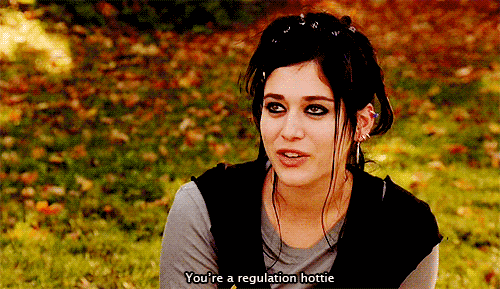
If Cady were unattractive, she would happily join the Math club, stay friends with Janis and Damien, and everything would go happily-ever-after. It would be a sitcom, and probably quite an amusing one.
But…
Cady’s attractiveness makes her a threat to the Plastics.
This is absolutely central to the plot. It isn’t a coincidence that the Plastics invited Cady to sit at the table with them. They effectively ‘talent-scouted’ her.
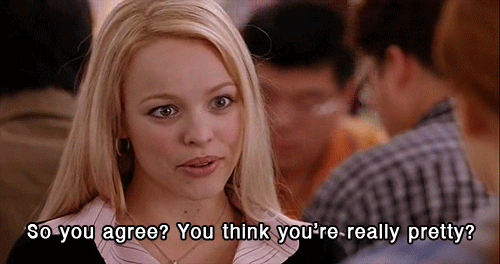
This is a classic Shit Test from Regina. She’s basically trying to suss out exactly how socially intelligent Cady is. Is she cunning like Regina, naive like Gretchen, or plain stupid like Karen?
Regina noticed Cady for the potential threat that she was. If the Plastics subsume her into the group (keep your enemies close!), they can control her.
If she were left as a free agent, she would earn the attention of the attractive boys (Aaron, for instance), and she would threaten the alpha status of Regina and the Plastics. She would delegitimize them.
Alpha groups still have in-group politics.
Cady alludes to this when describing how she found herself desiring Alpha Regina’s approval despite hating her. (This is a very common trope. I’m reminded of the toxic relationship between Cathy and Heathcliff in Wuthering Heights, and well, abusive relationships everywhere. People get drawn to power even if it burns them.)
Gretchen too chooses to be miserable within the Plastics rather than leave it, because the Plastics as a collective are the Alpha group. Better to be the bottom-feeder in the best group than to be outside of it.

Their sexuality and their attractiveness is their chief source of social currency.
The Plastics maintain their alpha status through attention, by being sexually desired by everybody else. They’re effectively the “tip of the spear”, desired and envied and loathed by everyone.
It’s interesting to study the social dynamics within the Plastics themselves.
Regina is rightfully Queen Bee.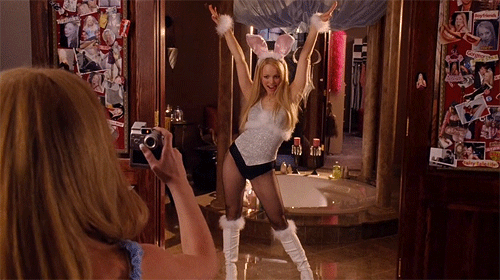
Regina George’s character was partly inspired by Alec Baldwin’s character in Glengarry Glen Ross, a super-alpha, manipulative Wall-Street hotshot.
She’s attractive, and more importantly, she’s the most socially intelligent. That’s what gives her the power to manipulate others so well. She understands people’s fears and insecurities. She’s also rich, and she drives– all of which are assets that she can leverage.
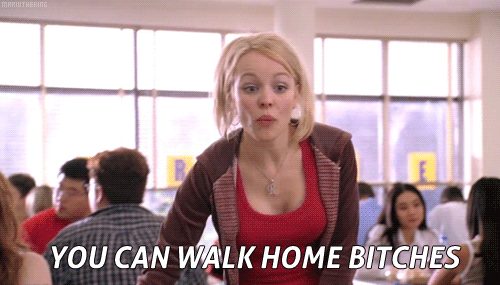
“Walk home, bitches,” she goes, when her clueless followers side with Cady instead of her, and attempt to use her arbitrary rules agains her- rules that she invented to control them and keep them in line.
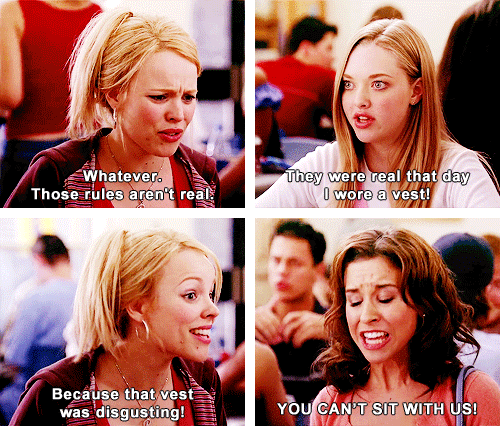
She demonstrates her sociopathic intelligence several times, and it’s clear that she derives pleasure from this.
The moment that spoke to me the most was when she phoned Cady with “I know your secret,” and then went on to say “Don’t you hate Gretchen for ratting on you?” while Gretchen was on the phone.

Socially manipulative people like Regina “store bullets”.

Gathering Blackmail Material 101
It’s like Batman keeping kryptonite in case he ever has to kill Superman. They know a lot about everybody, they have superior information- people like Gretchen (clueless) seek Regina’s approval, and freely divulge information to earn that (supeficial) approval.
Notice how insidious Regina is- she got Cady to insult Ms. Sharon in the burn book! All of this is leverage that Regina puts together to shore up her own social capital.
It took a deus ex machina to defeat Regina.

This is the “near death” trope- when a player experiences significant trauma and decides they don’t want to play anymore. This is a bit of a copout, and probably an artistic choice for the sake of the limitations of the movie.
Think about this- what would’ve happened if Regina didn’t get hit by the bus? Even if Cady decided to “quit the plastic scene”, Cady’s continued existence would threaten Regina’s dominance (as long as Regina cares about her social status). So Regina would have no choice but to decimate Cady altogether. It took a bus to take her out and make her decide that she didn’t want to play.
There’s no defeating people like Regina in a simple face-to-face confrontation.
She has too many assets (her own looks, the attention she gets from boys, and above all, her shrewd understanding of interpersonal relations, people’s insecurities, fears, wants and needs, and all the blackmail content she has).
I suppose maybe Cady could’ve gone the “exile” route and kept to herself and the math kids. That would have been a less satisfactory movie, of course.
Janis (who plays it straight) underestimated Cady.
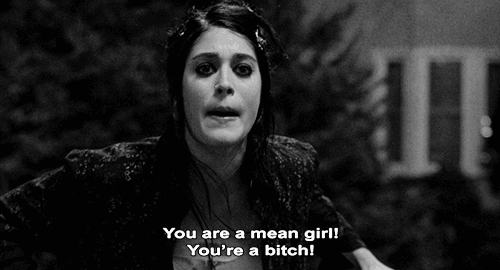
While she had nothing to lose by Cady joining her and Damien, she lost Cady to the Plastics. I think this happens a lot with “genuine” people (clueless) who play their cards straight. We assume that our honesty and straightforwardness will be appreciated.
Unfortunately, social reality can be like poker- there are real stakes involved, and you don’t win by “playing nice”. Well, different people have different interpretations of how the game ought to be played. Janis and Regina have completely opposite interpretations. Janis believes in being a straight-talker, Regina believes in manipulation for pleasure and profit.
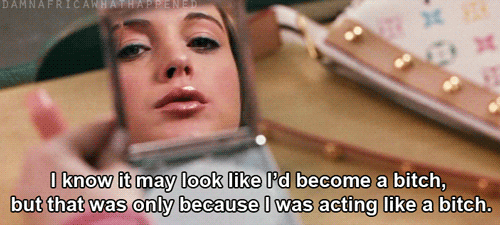
Will she, won’t she?
Gretchen and Karen aren’t mean, they’re clueless.
As I revisit quotes of the movie, I realize that both of Regina’s followers are “clueless” (in the Gervais Principle sense). They are eager for recognition, but they have no real idea how social dynamics actually work.
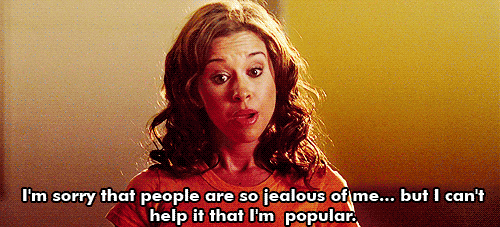
She has no idea how social reality actually works. She’s insulated and used to having Regina to take care of everything for her.
This ignorance of actual social dynamics explains why they immediately started following Cady around once Regina was out of the picture. Neither of them knows how to actually think for themselves. They’re programmed to follow the leader.
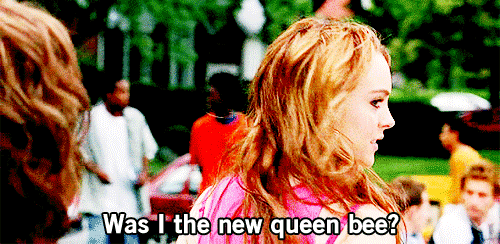
Cady was always too inquisitive, analytical and questioning to be an obedient follower.
Consider how Cady wanted revenge when Regina kissed Aaron. Gretchen and Karen wouldn’t dream of doing that. They would have conceded defeat and yielded to Regina, and perhaps convinced themselves that it was for the best. “You might think you’re attracted to him, but you’re not.”
Kissing Aaron was probably Regina’s way of establishing dominance over Cady.
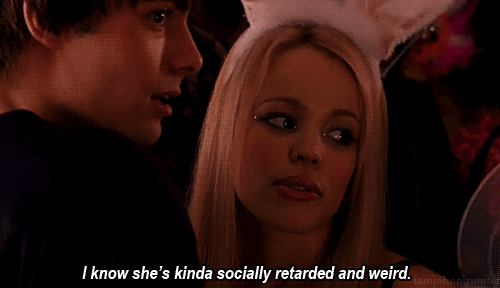
God, what a great bloody film.
Janis is an example of a Gervais “Loser”- a person who’s typically smarter than the Clueless (Gretchen, Karen), but voluntarily chooses not to play the game. She demonstrates her wit and intelligence when she outs Cady to Regina in the gymnasium.
Everybody relates with Losers.
They are the most commonly studied character in sitcoms and films. Most movies are made for Losers like us, which is why they tend to end with The Triumph Of The Loser. We’re supposed to like Janis, and choose to be like her. The straight-talking, mediocre-and-happy, better-than-average average people of the world. Some movies are made celebrating Sociopaths like Regina- see The Wolf Of Wall Street, for example.
If you want to understand Clueless- Gretchen, Karen- watch Michael Scott in The Office. If you want to understand Sociopaths… Regina’s a great example.
